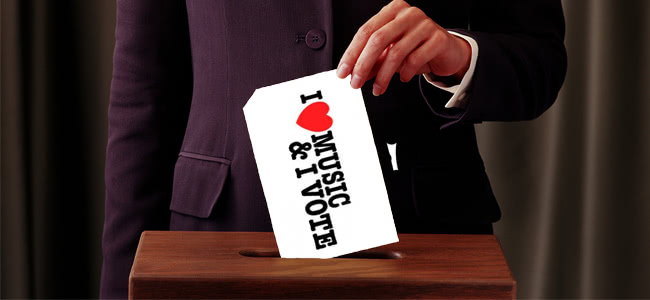With the 2016 Federal Election looming (it’s 2nd July, in case you forgot), the one thing that seems to be on the lips and minds of voters and even politicians alike is the country’s arts industry.
Regardless of who wins, it’s refreshing to see just about every major party involved in this year’s election indicate some degree of commitment to arts and music, solidifying their importance as national issues.
However, everything else seems to be par for the course. The party leaders are still talking a lot and their policies seem as confusing as ever. To give readers some help, we’ve devised a quick reference guide to help you figure out what each party will do for music if elected.
Liberal Party of Australia
Party Leader: Malcolm Turnbull
The Facts:
- Have not outlined a specific arts policy with commitments to funding and initiatives.
- Released a heavily criticised Federal Budget that did not include any major arts reforms.
- Previously issued highly controversial cuts to the Australia Council, which Malcolm Turnbull has not committed to reversing.
- Announced tax cuts for small businesses, providing a boon to many musical entities in Australia.
- Introduced 25 percent reduction in commercial radio license fees, whilst cutting funding for metropolitan community digital radio services.
Quote: “[The Abbott and Turnbull governments] have been the worst in our history in their treatment of artists and writers.” – Richard Flanagan, author
Australian Labor Party
Party Leader: Bill Shorten
The Facts:
- Have outlined an arts policy, promising to invest $160 million in arts and axe Catalyst funding program
- Described the cash injection as an “investment” rather than a cost.
- Would return control of arts funding decisions to an independent Australia Council.
- Would devote increased funding to school music programs, live music, and the Regional Arts Fund.
Quote: “We believe in the arts and we believe that the government should invest in the arts. We believe that Australia’s artistic identity- intangible and as ephemeral as it sometimes can be – is most definitely worth fighting for.” – Bill Shorten
Australian Greens
Party Leader: Richard Di Natale
The Facts:
- Have outlined a precise and detailed arts policy with monetary commitments to various initiatives and programs.
- Ensure the National Curriculum provides all Australian children with a rich and varied arts education.
- Would support national voices in the arts with a funding allocation of $1 million over the next four years.
- Support introduction of pill testing services at music and other cultural events.
- Oppose the use of Passive Alert Detection Dogs (sniffer dogs) at music and other cultural events.
Quote: “A vibrant, well-resourced and independent arts community is core to any thriving society. Yet instead of investing in our arts and artists, the Liberal government launched an unprecedented attack on the arts sector under former Arts Minister George Brandis,” – MP Adam Bandt, Greens Arts spokesperson
Australian Sex Party
Party Leader: Fiona Patten
The Facts:
- Previously outlined a Victorian music platform, addressing live music and licensing issues, however, with few tangible propositions.
- Unique focus on freedom of expression and freedom of speech and reforming legislation that impedes upon these freedoms.
- No explicit fiscal commitment or indication of where music would fit into budget.
- Support introduction of pill testing services at music and other cultural events.
- Oppose the use of Passive Alert Detection Dogs (sniffer dogs) at music and other cultural events.
Quote: “The [ASP] recognises the contribution that live music and its related industries bring both economically, culturally and socially…” – Fiona Patten
The Arts Party
Party Leader: PJ Collins
The Facts:
- Party founded for the express purpose of fostering creativity and artistic expression in Australia.
- Advocate mandatory music education in all primary schools.
- Support the APRA tax offset, boosting venues, live music, performance, and income for all.
- Would continue funding to Sounds Australia and return funding to the Live Music Office.
- Would create a charter for musicians at venues that guarantees fair treatment and equipment security rights.
Quote: “…we want to basically fund more creativity and more art and more performance and we want it to be more available to more people, and that’s rurally and in urban areas, it’s across the board.” – PJ Collins




































